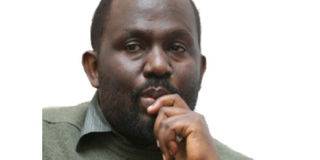Of kings and presidents-for-life in this Republic of Uganda

My good friend Kalundi Serumaga from time to time likes to needle what he calls “Republicans” in Uganda, and Africa more broadly.
“Republicans” is a catch-all word by which Kalundi means many things. Often, it is a jibe at modernists who tend to see most “traditional” things (including in Uganda kingdoms) as backward. Sometimes, he uses it to mean defenders of the colonial African state and its borders.
A cheeky fellow, his range is wide, but it is these above two that interest us today. The “Republicans” say Kalundi is “nativist” and “conservative”. But is he? Kalundi is also East Africanist and Pan-Africanist, and thinks African borders are a joke that will in future evaporate in the many crises that have beset Africa’s neo-colonial states. In their place, we shall have more organic African states informed by the continent’s culture, history, and geography.
In that sense he takes what, in keeping with the Nkrumahist tradition, is an extreme leftist position, that makes the “Republicans” seem conservative.
All this has played out interestingly in Uganda over, especially, the last 15 years as the authoritarianism of the Uganda government has risen, and lately in the return to the Aminist-era quest to make President Yoweri Museveni president-for-life with the age limit amendment of the Constitution to enable him run for office well beyond his 75th birthday.
The opposition to chopping up the Constitution, election rigging, and regime excesses in the south has taken two very distinct – and seemingly contradictory – trends in central Uganda (i.e. Buganda).
On one hand, it has been very radical (though not universal), as we have seen in the very militant support opposition leader Kizza Besigye has enjoyed among the youth in the region over the years.
Last year, it took a further turn, in the wave that elected Bobi Wine (the “Ghetto president”) as Member of Parliament for Kyadondo East in one of the country’s most dramatic by-elections.
On the other hand, the Buganda upper middle class, has responded to the infirmities of Museveni’s rule with aloofness and disdain. Many of my friends from central, express themselves with a British nose-turned-up and stiff-upper-lip scorn. If you didn’t know, you’d think they were indifferent. Wrong.
To understand what is going on, we need to go back to Kalundi’s criticism of “Republicans”.
Of all the kingdoms that followed the restoration, only Buganda’s has taken deep enough roots for it to have re-established itself as having a life of its own separate from the kindness of the central state.
Those with a sense of history, will remember that both before and after the coronation of Ronnie Mutebi as Kabaka (king), the matter was not settled.
There were a few challenges to his crown sponsored by NRM factions, that are unthinkable today. Thus the crown sits easily on Mutebi’s head as a result of his having consolidated his kabakaship.
Thus in addition to the legitimacy of history and culture, there was a rally around the Buganda crown, from which it drew new sources of legitimacy.
The result is that while “kingdomless” parts of Uganda or those with feeble monarchs, feel a deep sense of alienation from the central government’s injury to their interests, it is felt differently in Buganda where the more legitimate and authentic authority is the kingdom.
Where the Republicans feel betrayed by president-for-life projects, and orphaned by repression and corruption, many Buganda elite feel contempt, some seeing these transgressions as “obukopi” (a lack of class).
The monarchists in other parts of Uganda probably feel the same thing, though to a lesser degree.
If the kingdoms hadn’t been restored, it is reasonable to assume that as happened during the last part of Milton Obote I and the even more difficult period of Obote II, Buganda’s contradiction with the regime would all have been militant.
So you have one of the great ironies of Ugandan politics today.
Kalundi’s “Republicans” tend to be anti-monarchist, or politely indifferent to kingdoms and their kings, at best.
However, the existence of the kingdoms has allowed the Republic to survive with less opposition, despite its many failures, because the monarchists hold it to low standards, and are able to comfortably be Ugandans, without having to embrace Kampala as the central authority in their lives. One monarchist, with masterful disdain, told me of the Museveni State House: “He was not ready, nor had he been prepared to lead. What did you expect?”
He was telling me that because he didn’t expect much from Museveni’s rule, he could not be expected to get very worked up about its shortcomings. And that those of us who know better, should do the same.
This has created a pool of benign opposition and moderate nooks born of snobbery, which has kept a lid of the spread of militant anti-regime politics in Uganda against things like the recent constitution mugging.
It’s complicated.
Mr Onyango-Obbo is the publisher of Africa data visualiser Africapedia.com and explainer site Roguechiefs.com. Twitter@cobbo3




